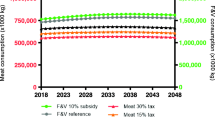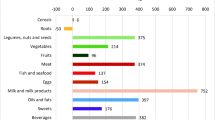Abstract
With “consumer demand” credited with driving major changes in the food industry related to food quality, safety, environmental, and social concerns, the contemporary politics of food has become characterized by a variety of attempts to redefine food consumption as an expression of citizenship that speaks of collective rights and responsibilities. Neoliberal political orthodoxy constructs such citizenship in terms of the ability of individuals to monitor and regulate their own behavior as entrepreneurs and as consumers. By contrast, many proponents of alternative food networks promote the idea that food citizenship is expressed through participation in social arrangements based on solidarity and coordinated action rather than on contractual and commoditized relationships between so-called “producers” and “consumers.” This paper thus focuses its analysis on the strategies used to mobilize people as consumers of particular products and the ways, in turn, in which people use their consumption choices as expressions of social agency or citizenship. In particular, the paper examines how the marketing, pricing, and distribution of foods interact with food standards to enable and constrain specific expressions of food citizenship. It is argued that narrow and stereotypical constructions of the “ethical consumer” help to limit the access of particular people and environmental values, such as biodiversity, to the ethical marketplace.
Similar content being viewed by others
Notes
In 2002, the organic market grew approximately 12% in North America, 8% in Europe, and 15–20% in Australia (Sahota 2004). Following several years of growth between 20% and 40%, the UK experienced a slowing of expansion mirrored in other European countries with comparatively large organic markets (Sahota 2004). Average retail price premiums for organic foods range from 10% to 15% in Germany to 80% in Australia and 10–100% in the US and UK (Halpin and Brueckner 2004b; Sligh and Christman 2003).
References
Amin, A. 2002. Spatialities of globalization. Environment and Planning A 34(3): 385–399.
Baker, L. 2004. Tending cultural landscapes and food citizenship in Toronto’s community gardens. Geographical Review 94(3): 305–325.
Barnett, C., N. Clarke, and P. Cloke. 2005. The political ethics of consumerism. Consumer Policy Review 15(2): 45–51.
Burchell, G. 1993. Liberal government and techniques of the self. Economy and Society 22(3): 267–282.
Cunningham, R. 2001. The organic consumer profile: Not only who you think it is!. Alberta: Strategic Information Services Unit, Agriculture, Food, and Rural Development.
Dean, M. 1999. Governmentality: Power and rule in modern society. London: Sage.
DeLind, L. 2002. Place, work, and civic agriculture: Common fields for cultivation. Agriculture and Human Values 19(3): 217–224.
Dobson, A. 2000. Green political thought, 3rd ed. London: Routledge.
Dobson, A. 2003. Citizenship and the environment. Oxford: Oxford University Press.
Draper, A., and J. Green. 2002. Food safety and consumers: Constructions of choice and risk. Social Policy and Administration 36(6): 610–625.
DuPuis, M., and D. Goodman. 2005. Should we go home to eat? Toward a reflexive politics of localism. Journal of Rural Studies 21: 359–371.
DuPuis, M., D. Goodman, and J. Harrison. 2006. Just values or just value? Remaking the local in agro-food studies. In Between the local and the global: Confronting complexity in the contemporary agri-food sector, ed. T. Marsden, and J. Murdoch, 241–268. Oxford: Elsevier.
Gabriel, Y., and T. Lang. 1995. The unmanageable consumer: Contemporary consumption and its fragmentation. London: Sage Press.
Goodman, M. 2004. Reading fair trade: Political ecological imaginary and the moral economy of fair trade foods. Political Geography 23: 891–915.
Guthman, J. 2004. Agrarian dreams. The paradox of organic farming in California. Berkeley: University of California Press.
Halpin, D., and M. Brueckner. 2004. The retail pricing, labeling, and promotion of organic food in Australia. In Australian organic industry profile, ed. D. Halpin, 63–92. Canberra, ACT: Department of Agriculture, Fisheries, and Forestry.
Halpin, D., and M. Brueckner. 2004b. Second report – retail price study: Profile of the Australian organic agriculture industry. Canberra, ACT: Department of Agriculture, Fisheries, and Forestry.
Hamm, U., F. Gronefeld, and D. Halpin. 2002. Analysis of the European market for organic food. Organic marketing initiatives and rural development, vol. 1. Aberystwyth: School of Management and Business, University of Wales.
Hassall and Associates. 1996. The domestic market for Australian organic produce: An update. Canberra, ACT: Rural Industries Research and Development Corporation.
Higgins, V., and S. Lockie. 2001. Getting big and getting out: Government policy, self-reliance, and farm adjustment. In Rurality bites: The social and environmental transformation of rural Australia, ed. S. Lockie, and L. Bourke, 178–190. Sydney, NSW: Pluto Press.
Higgins, V., and S. Lockie. 2002. Re-discovering the social: Neo-liberalism and hybrid practices of governing in natural resource management. Journal of Rural Studies 18(4): 419–428.
Hinrichs, C. 2003. The practice and politics of food system localization. Journal of Rural Studies 19(1): 33–45.
Holzer, B. 2006. Political consumerism between individual choice and collective action: Social movements, role mobilization, and signaling. International Journal of Consumer Studies 30(5): 405–415.
Latta, P. 2007. Locating democratic politics in ecological citizenship. Environmental Politics 16(3): 377–393.
Lemke, T. 2001. The birth of bio-politics: Michel Foucault’s lecture at the Collège de France on neo-liberal governmentality. Economy and Society 30(2): 190–207.
Lockie, S. 2002. “The invisible mouth”: Mobilizing “the consumer” in food production-consumption networks. Sociologia Ruralis 42(4): 278–294.
Lockie, S. 2006a. Networks of agri-environmental action: Temporality, spatiality, and identity within agricultural environments. Sociologia Ruralis 46(1): 22–39.
Lockie, S. 2006b. Capturing the sustainability agenda: Organic foods and media discourses on food scares, environment, genetic engineering, and health. Agriculture and Human Values 23(3): 313–323.
Lockie, S. 2007. Conversion or co-option? The implications of “mainstreaming” for producer and consumer agency within fair trade networks. In Creating food futures: Trade, ethics and the environment, ed. C. Farnworth, J. Jiggins, and E. Thomas. Aldershot: Gower.
Lockie, S., and M. Goodman. 2006. Neoliberalism, standardization, and the problem of space: Competing rationalities of governance in fair trade and mainstream agri-environmental networks. In Between the local and the global: Confronting complexity in the contemporary agri-food sector, ed. T. Marsden, and J. Murdoch, 95–117. Oxford: Elsevier.
Lockie, S., and D. Halpin. 2005. The “conventionalization” thesis reconsidered: Structural and ideological transformation of Australian organic agriculture. Sociologia Ruralis 45(4): 284–307.
Lockie, S., D. Halpin, and D. Pearson. 2006a. Understanding the market for organic food. In Organic agriculture: A global perspective, ed. P. Kristiansen, A. Taji, and J. Reganold, 245–258. Canberra, ACT: CSIRO Publishing.
Lockie, S., and V. Higgins. 2007. Roll-out neoliberalism and hybrid practices of regulation in Australian agri-environmental governance. Journal of Rural Studies 23(1): 1–11.
Lockie, S., K. Lyons, G. Lawrence, and J. Grice. 2004. Choosing organics: A path analysis of factors underlying the selection of organic food among Australian consumers. Appetite 43: 135–146.
Lockie, S., K. Lyons, G. Lawrence, and D. Halpin. 2006b. Going organic: Mobilizing networks for environmentally responsible food production. Wallingford: CABI Publishing.
Lockie, S., and N. Salem. 2005. Governing consumption: Mobilizing “the consumer” within genetically-modified and organic food networks. In Agricultural governance: Globalization and the new politics of regulation, ed. V. Higgins, and G. Lawrence, 153–168. London: Routledge.
Marsden, T. 2003. The condition of rural sustainability. Assen: Royal Van Gorcum.
Marsden, T., and R. Sonnino. 2005. Rural development and agri-food governing in Europe: Tracing the development of alternatives. In Agricultural governance: Globalization and the new politics of regulation, ed. V. Higgins, and G. Lawrence, 50–68. London: Routledge.
Miller, P., and N. Rose. 1990. Governing economic life. Economy and Society 19(1): 1–31.
Miller, P., and N. Rose. 1997. Mobilizing the consumer: Assembling the subject of consumption. Theory, Culture, and Society 14(1): 1–36.
Peck, J., and A. Tickell. 2002. Neoliberalizing space. Antipode 34(3): 380–404.
Richter, T., O. Schmid, U. Meier, D. Halpin, P. van den Berge, and P. Damary. 2001. Marketing approaches for organic products in supermarkets: Case studies from Western Europe and the United States of America conducted in 2000. Ackerstrasse: Research Institute of Organic Agriculture.
Rose, N. 1999. Powers of freedom: Reframing political thought. Cambridge: Cambridge University Press.
Sahota, A. 2004. Overview of the global market for organic food and drink. In The world of organic agriculture: Statistics and emerging trends, ed. H. Willer, and M. Yussefi, 21–26. Bonn: International Federation of Organic Agriculture Movements.
Scott, L. 2006. Wal-Mart “greening” could have a huge impact. http://www.walmartstores.com/GlobalWMStoresWeb/navigate.do?catg=610. Accessed 22 June 2006.
Seyfang, G. 2006. Ecological citizenship and sustainable consumption: Examining local organic food networks. Journal of Rural Studies 22: 383–395.
Sligh, M., and C. Christman. 2003. Who owns organic? The global status, prospects and challenges of a changing organic market. Pittsboro: Rural Advancement Foundation International.
Turner, B. 1993. Contemporary problems in the theory of citizenship. In Citizenship and social theory, ed. B. Turner, 1–18. London: Sage.
Wilkinson, J. 2006. Fair trade moves centre stage. Working Paper 3. Rio de Janeiro: Edelstein Centre for Social Research.
Acknowledgements
The author would like to acknowledge financial support provided by the Australian Research Council for the project “The production and regulation of agricultural biodiversity” (Project No. DP0664599).
Author information
Authors and Affiliations
Corresponding author
Rights and permissions
About this article
Cite this article
Lockie, S. Responsibility and agency within alternative food networks: assembling the “citizen consumer”. Agric Hum Values 26, 193–201 (2009). https://doi.org/10.1007/s10460-008-9155-8
Received:
Accepted:
Published:
Issue Date:
DOI: https://doi.org/10.1007/s10460-008-9155-8




